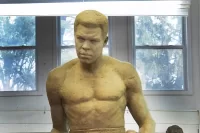
Senior Ali Rabideau’s winning idea in the 2017 Bobcat Ventures pitch competition — worth a tidy $9,000 — grew from a summer job: helping a Lewiston nonprofit make some money growing and selling products made from medicinal herbs and flowers.
Rabideau, a talented organizer and gardener, worked at the Center for Wisdom’s Women, which provides safe haven and support for at-risk women experiencing homelessness, incarceration, abuse, or addiction.
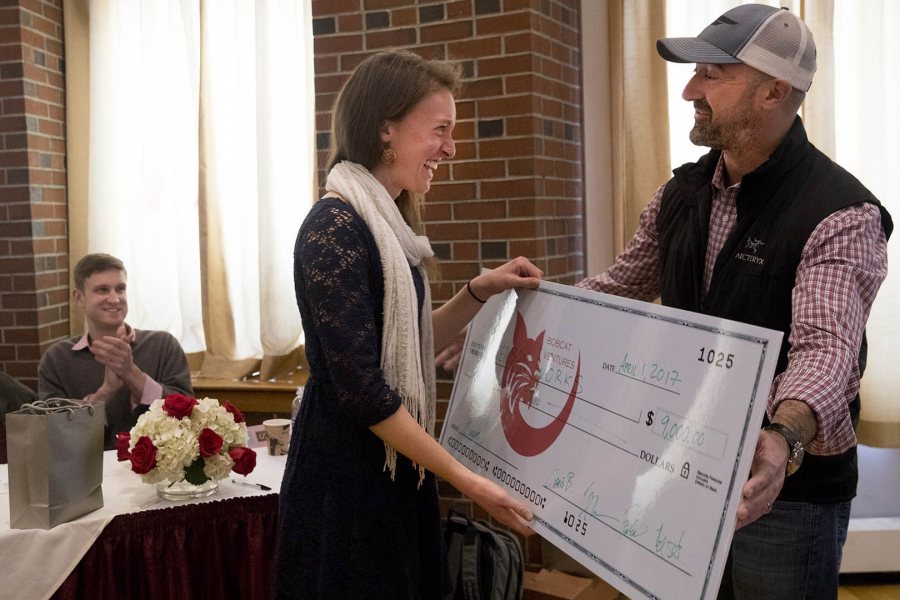
Bobcat Ventures judge Chris Barbin ’93 presents first-place winner Ali Rabideau ’17 with a check for $9,000 to support Herban Works. (Phyllis Graber Jensen/Bates College)
“The women can tell you first hand the power of the plants and the products we have to heal the body and spirit,” Rabideau told the judges during her pitch. “Last summer, we sold $350 of our first three products” — calendula salve, calendula tea, and salted herbs. “We only had to stop because we ran out of plants.”
The business is called Herban Works, and “we have outgrown the garage, so to speak,” said Rabideau, a women and gender studies major from Natick, Mass., as she pitched the business.
She ended her presentation with a personal touch, handing the judges a sample of the salve. “Open it and smell it. It’s really nice,” she said.
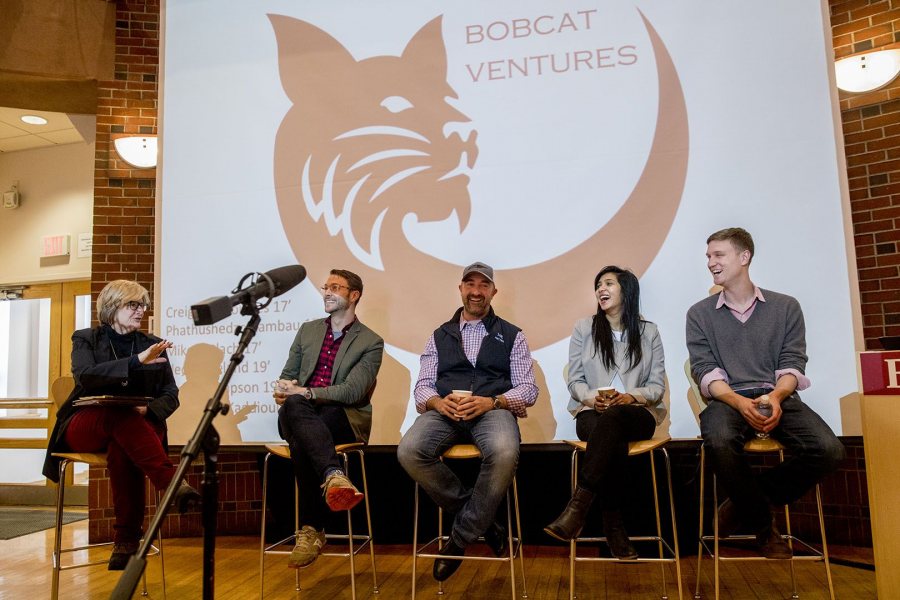
President Clayton Spencer leads a pre-event discussion with the judges. From left, Ben Schippers ’04, Chris Barbin ’93, Tasnia Huque ’12, and Reid Christian ’12. (Phyllis Graber Jensen/Bates College)
Now in its third year, the $15,000 Bobcat Ventures pitch competition is student-run and alumni-judged, with prizes funded by Bates alumni and parents. Held on April 1, the day-long event began with President Clayton Spencer hosting a panel discussion with alumni judges, each of whom is in business: Chris Barbin ’93, Ben Schippers ’04, Tasnia Huque ’12, and Reid Christian ’12.
From there, a dozen students made presentations in areas like real estate, music recording, hair care, ride sharing, community-based NGOs, and fine art sales.
“Great job,” said judge Chris Barbin ’93 after Rabideau’s winning pitch. “I love the idea that you’re already to market on it.”
Barbin asked Rabideau, whose work at the CWW was funded by the college’s Harward Summer Civic Fellowship program, about the market penetration she hoped to achieve. “We hope statewide and nationwide,” she answered, pointing to a similar but national operation, Thistle Farms in Nashville, Tenn., that has “been advising and supporting us.”
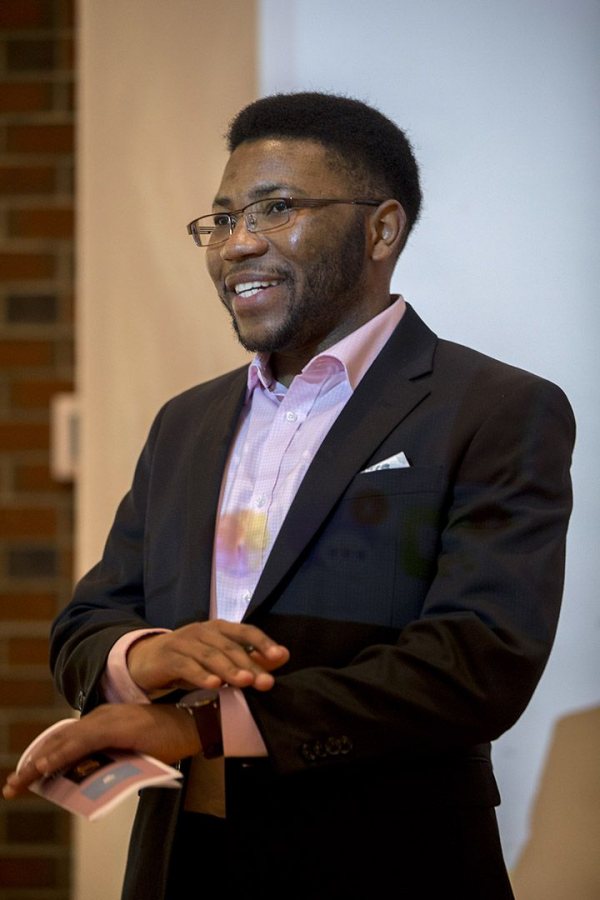
Phathutshedzo Rambau ’17 of Morebeng, South Africa, serves as MC for the Bobcat Ventures competition. (Phyllis Graber Jensen/Bates College)
Fellow judge Ben Schippers ’04 praised Rabideau for how she “carried the brand” of the CWW throughout her presentation. “That goes a long way,” he said, noting that “the branded product is very strong, as well.”
“Love the mission,” said judge Tasnia Huque ’12, adding that Rabideau social-enterprise angle “is kind of buzzy right now, but it’s on trend, especially the focus on the wellness-in-women space.”
After Rabideau was equivocal when asked, by Schippers, if she would stay in Lewiston after graduation to grow the business, Huque advised her to be more certain when pitching. “Just say, ‘Yes.’ You want to project that this is your passion.”
Besides the thrill of seeing that big check come her way during the awards presentation, Rabideau is surprised to see herself in a new way.
“I never envisioned myself as an entrepreneur,” she said, thanking the college and the Bobcat Ventures team for helping to express a broad definition of entrepreneurship. “They actually came to me and said, ‘This is a social enterprise. This could work. Why don’t you apply?’”
Rabideau said that the knitting together of two strong strands of the Bates experience — entrepreneurism and social awareness — “was my favorite part of the experience: Having the kind of work you value brought to life by an entrepreneurship competition.”
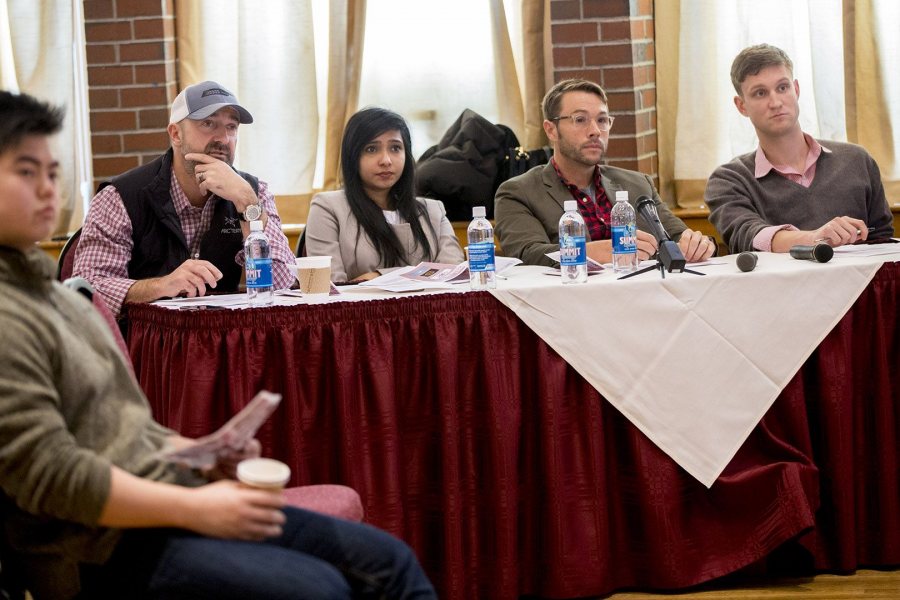
Judges Barbin, Huque, Schippers, and Christian listen to a pitch. (Phyllis Graber Jensen/Bates College)
Bobcat Ventures awarded cash prizes to three other ideas from the dozen pitches.
Collecting the $4,000 second prize was Julien Lewin ’20 of Seattle, Wash., who pitched an idea for a laptop paper holder that makes it “easy to transcribe and read documents.” It’s superior to competitors, Lewin told the judges, because it holds documents above a laptop, rather than to the side.
The judges awarded two third prizes of $1,000 each. One went to Alexandria Onuoha ’20 of Malden, Mass., and her idea for Manetain Hair Care to fill consumer demand for natural and organic hair products. “Salons do not cater to natural hair care,” she told the judges.
Ben Nussbaum ‘19 of Ridgefield, Conn., pitched an automotive ecommerce idea. Unlike other online car-buying sites, such as Cars.com, Nussbaum said that Autolink would “digitalize the local buyer-seller interaction” — specifically the inspection of a used car, a tricky part of any long-distance car purchase — to create “true used-car ecommerce.”
“I thought all the presentations and pitches were great,” Barbin said. “I loved the diversity: tech, consumer, non-profit. Just really cool ideas.”
The judging panel comprised Barbin, a Bates trustee who is CEO of Appirio, an IT firm based in Indianapolis, Ind.; Schippers, co-founder of HappyFun Corp., a web and mobile app developer based in Brooklyn; and Huque and Reid Christian ’12, associates with Cue Ball Capital and Battery Ventures, respectively.
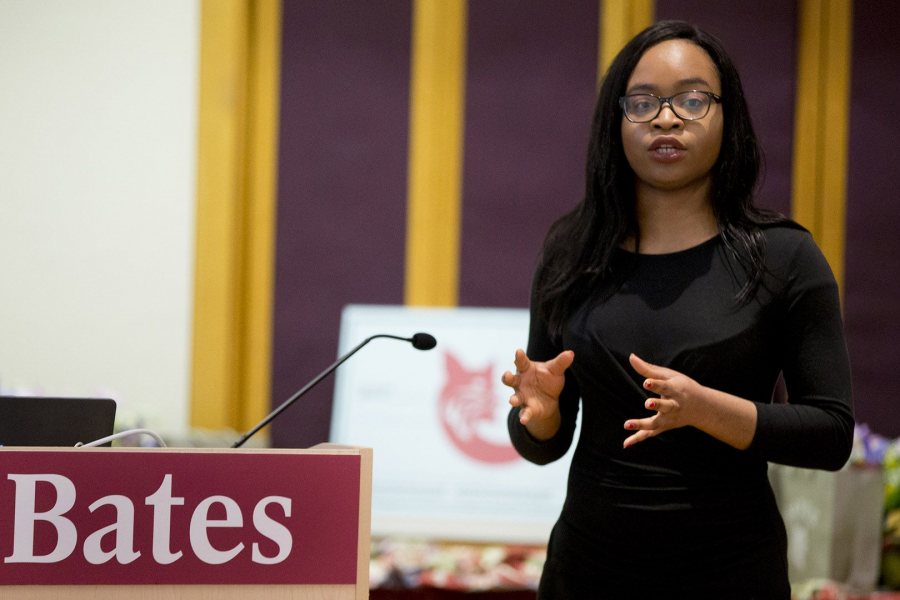
Alexandria Onuoha ’20 of Malden, Mass., presents her pitch for a line of natural and organic hair care products. (Phyllis Graber Jensen/Bates College)
In closing, Schippers spoke of the nature of entrepreneurial competition.
“Unfortunately, there are a lot of ‘no’s,’” he said. “It comes with the territory. This doesn’t mean you’re not doing a good job, or your idea isn’t great, or it’s a failure. It’s part of the entrepreneurial spirit that you just need to keep going.”
Also speaking to the group was one of the founders of Bobcat Ventures in 2015, Matt Perejda ’14. “We had a ton of support from Bates alumni to get this going,” he said, including trustee emeritus Bruce Stangle ’70.
Keeping Bobcat Ventures strong, Perejda said, reflects support “from the school, the students, the judges — everyone who puts in the work and gives their time. Life is busy, yet everyone in this room makes it happen.”
The growth of Bobcat Ventures, he said, “has been a wild run. We’ve come so far, and I’m super-excited to see where it can go.”
The student leaders of Bobcat Ventures are Creighton Foulkes ’17 of Belmont, Mass.; El Khansaa Kaddioui ’20 of Elhajeb, Morocco; Edward Moreland ’19 of Monkton, Md.; John Mulach ’17 of Rocky River, Ohio; Phathutshedzo Rambau ’17 of Morebeng, South Africa; and Cristopher Thompson ’19 of Macon, Ga.
Additional reporting by Sarah Rothmann ’19.

